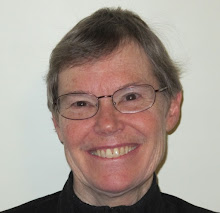Stella Ullman, right, was German, and she did not know much, if any, English. My sister and I – little girls who lived nearby – enjoyed eating her delicious cookies as we visited her new home (a small apartment in a converted barn up the hill from our house). Her Hungarian husband, Bela Ullman, probably knew more English, but he was busy at work most days, leaving Stella home alone. She readily welcomed us, and encouraged us to read aloud to her from some American children's books that happened to be in her living room. (Years later, I learned that my cousin Marion Nichols, a retired school teacher, had supplied those books and was giving Stella English lessons.)
I had previously (2009) written about my memories of Stella and Bela, but did not know much about the details or timing of their arrival in the U.S. This summer while cleaning up for a party and consolidating some old boxes, I found a very yellowed copy of this old newspaper photo. Fortunately my cousin Dave Brewster had also found, and digitized, a copy in better condition than mine. His copy displays a handwritten date: Sept. 26, 1949. Mine is undated, though the headers at the top give good clues:
Read The Danvers HeraldDanvers OWN and ONLY Newspaper
-----------------------------------------------
79TH YEAR, NO 40
I've tried to find my earlier piece, but the 2009 link to my Danvers Herald column is no longer working. Here is a copy that I had revised slightly and read aloud at Gateway City Arts, Holyoke, MA, in 2015.
Remembering Danvers
[11/30/09, slight
edits 3/30/15]
New inhabitants in an
old barn
By Sandy Nichols Ward
"I'm hungry," I said aloud, as the nice German
lady opened the door. I was a little girl with braids, a shy first-grader. I
didn't know much about this lady, but remembered yummy cookies she had served
to me and to my younger sister. I was hoping for more cookies, so I had walked
up the hill to the barns at the top of Locust Lawn, entered the workshop door
of the smaller barn, and knocked on the inner door.
This barn used to be in sad shape, with rotting boards and
holes in the interior floor. I think my father and grandfather fixed it, or
hired someone to do the work. The outside of the barn hadn't changed, nor had
the entryway, a narrow dusty room with a huge wooden workbench under windows
dim with dirt. My sister and I have
vivid memories of pulling open one of the workbench drawers and discovering a
nest of baby mice, all naked and pink, squirming inside the nest. But that was before the remodeling of the
inner part of the barn to create a home for Bela and Stella, a D.P. couple
sponsored by my grandfather. [I didn't know then what D.P. meant; I've since
learned about the Displaced Persons program resettling refugees after World War
II.]
Stella smiled and beckoned me into the warm living room. Lace
curtains on the windows, pictures on the walls, rugs on the floor, and an array
of used furniture made this barn space into a cozy, if humble, home. She
pointed to a pile of colorful children's books.
I began looking at the books, while Stella stepped into the kitchen. She
emerged with a plate of gingerbread cookies and sat beside me. We looked at the
books together. She wanted me to read the words aloud. She tried to repeat them
exactly, practicing English, her new language.
Stella was new to Danvers, new to America.
Stella's Hungarian husband Bela was skillful in
leather-tooling and made a lovely leather cover for my parents' guest book. He
also had engineering experience and worked for my father at Nichols &
Clark, Inc., for about seven years (1950-56?). I wish I knew more about their
story and how they came to Danvers, but I was young when they arrived. My focus
then was on cookies, not world history or the plight of refugees. My mother
also taught me not to ask too many questions. She was trying to teach manners,
for instance telling me that it is not polite to say "I'm hungry!"
when you first enter someone's door. I
hope Stella did not know enough English at that time to catch my impolite utterances.
I have fond memories of visiting Bela and Stella's home in
that barn. They always welcomed us – my sister and I, the little girls from
down the hill – cheerfully. We marveled at their beautiful Christmas tree,
larger than ours, and decorated with many tiny white candles. REAL
candles! Each candle stood in a little
metal holder clipped onto a green branch. The holder was like a saucer that
caught the hot wax as the candle burned and melted. My mother fretted about the fire hazard, but
we loved the special beauty of their tree with its candles and other old-world
decorations.
Stella and Bela loved children and wished for a family of
their own. Stella's sister and brother-in-law followed them to Danvers and
lived in the small apartment at my grandfather's house. Both couples eventually
moved to Long Island. I was happy to learn that Stella had several children
there. She later thanked me for helping her learn English during her first
years in Danvers. I was surprised that
my role had been so helpful; I thought I was just mooching cookies! I have recently learned that my cousin Marion
Nichols provided real instruction in English. Stella went regularly to 98
Preston Street for her lessons. Marion also provided the children's books that
Stella shared with me. Perhaps I was part of a careful family plan in support
of these immigrants my grandfather was sponsoring, or perhaps my role was
incidental. I really don't know. I just know that I loved the cookies and
Stella's kind attention whenever I knocked on that barn door.


No comments:
Post a Comment